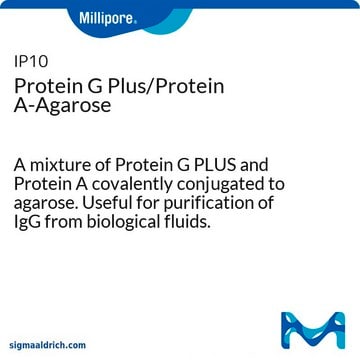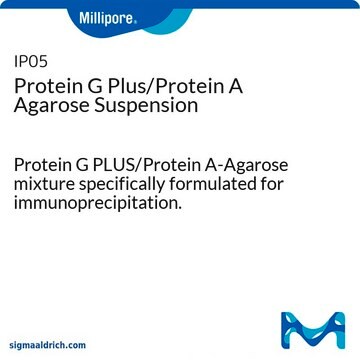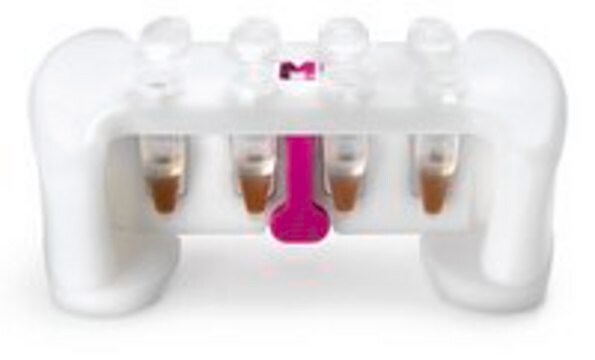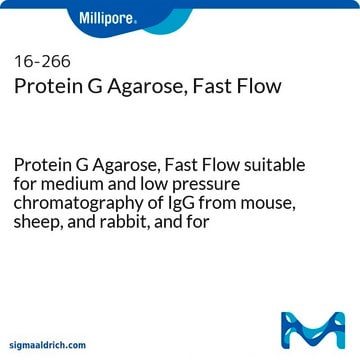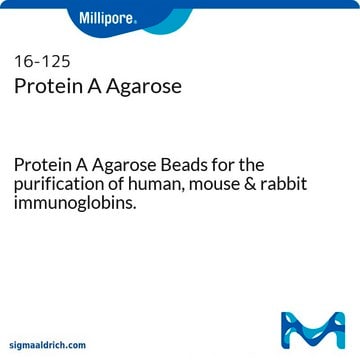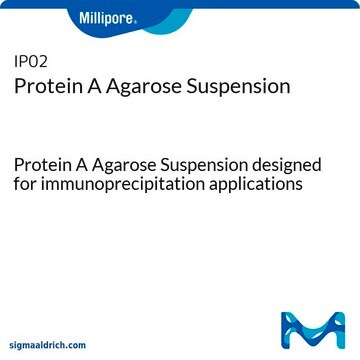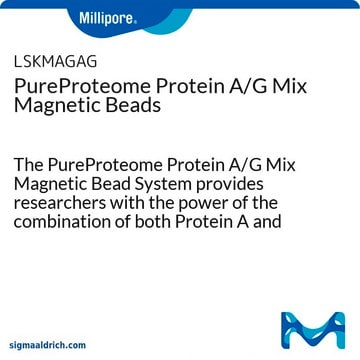IP04
Protein G Plus-Agarose Suspension
Protein G PLUS agarose suspension specifically formulated for immunoprecipitation.
Anmeldenzur Ansicht organisationsspezifischer und vertraglich vereinbarter Preise
Alle Fotos(1)
About This Item
UNSPSC-Code:
41116133
NACRES:
NA.56
Empfohlene Produkte
Form
slurry (Liquid)
Enthält
≤0.1% sodium azide as preservative
Hersteller/Markenname
Calbiochem®
Lagerbedingungen
do not freeze
Methode(n)
immunoprecipitation (IP): suitable
Eignung
suitable for immunoprecipitation
Versandbedingung
wet ice
Lagertemp.
2-8°C
Allgemeine Beschreibung
Designed for immunoprecipitation applications. This product is blocked with BSA to reduce non-specific binding and cannot be used for purification; best for bovine, goat, human, and rat IgG and for mouse IgG1.
Protein G PLUS agarose suspension specifically formulated for immunoprecipitation.
Warnhinweis
Toxicity: Standard Handling (A)
Sonstige Hinweise
Agarose solution is supplied ready to use. Protein G Plus agrarose is blocked with BSA and should not be used for immunoglobulin purification or covalent cross-linking. For immunoprecipitation reactions 15 µl/µg primary antibody is recommended. Preclearing will minimize extra bands resulting from nonspecific precipitation. To preclear, add to the sample 20 µl agarose conjugate and 1 µg normal IgG from the same species as the immunoprecipitating antibody. When immunoblotting is used for detection, some secondary antibodies can react nonspecifically with BSA or other proteins present at high concentrations in the sample. This can be eliminated by reducing the concentration of secondary antibody.
Rechtliche Hinweise
CALBIOCHEM is a registered trademark of Merck KGaA, Darmstadt, Germany
Lagerklassenschlüssel
11 - Combustible Solids
WGK
WGK 1
Flammpunkt (°F)
Not applicable
Flammpunkt (°C)
Not applicable
Analysenzertifikate (COA)
Suchen Sie nach Analysenzertifikate (COA), indem Sie die Lot-/Chargennummer des Produkts eingeben. Lot- und Chargennummern sind auf dem Produktetikett hinter den Wörtern ‘Lot’ oder ‘Batch’ (Lot oder Charge) zu finden.
Besitzen Sie dieses Produkt bereits?
In der Dokumentenbibliothek finden Sie die Dokumentation zu den Produkten, die Sie kürzlich erworben haben.
Kunden haben sich ebenfalls angesehen
Boyang Zhao et al.
American journal of physiology. Cell physiology, 302(1), C27-C45 (2011-09-24)
Although extensive phosphoproteomic information is available for renal epithelial cells, previous emphasis has been on phosphorylation of serines and threonines with little focus on tyrosine phosphorylation. Here we have carried out large-scale identification of phosphotyrosine sites in pervanadate-treated native inner
Leo K Iwai et al.
Journal of proteome research, 9(6), 3135-3145 (2010-05-05)
Type 1 diabetes, in human patients and NOD mice, results from an immune attack on insulin-producing beta-cells of the pancreas by autoreactive T lymphocytes. In NOD mice, genetically controlled perturbations in the signaling pathways downstream of the antigen-specific T cell
Matthew M Halpert et al.
Stem cells and development, 25(10), 774-787 (2016-03-17)
The remarkable functional plasticity of professional antigen-presenting cells (APCs) allows the adaptive immune system to respond specifically to an incredibly diverse array of potential pathogenic insults; nonetheless, the specific molecular effectors and mechanisms that underpin this plasticity remain poorly characterized.
Xin Wang et al.
The Journal of biological chemistry, 294(43), 15733-15742 (2019-09-06)
REV7, also termed mitotic arrest-deficient 2-like 2 (MAD2L2 or MAD2B), acts as an interaction module in a broad array of cellular pathways, including translesion DNA synthesis, cell cycle control, and nonhomologous end joining. Numerous REV7 binding partners have been identified
Matthew M Halpert et al.
FASEB journal : official publication of the Federation of American Societies for Experimental Biology, 34(6), 8082-8101 (2020-04-17)
Mammalian immune responses are initiated by "danger" signals--immutable molecular structures known as PAMPs. When detected by fixed, germline encoded receptors, pathogen-associated molecular pattern (PAMPs) subsequently inform the polarization of downstream adaptive responses depending upon identity and localization of the PAMP.
Unser Team von Wissenschaftlern verfügt über Erfahrung in allen Forschungsbereichen einschließlich Life Science, Materialwissenschaften, chemischer Synthese, Chromatographie, Analytik und vielen mehr..
Setzen Sie sich mit dem technischen Dienst in Verbindung.
